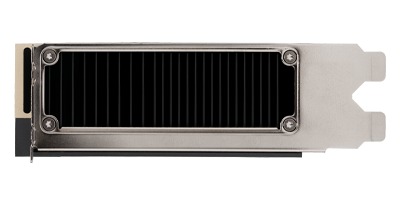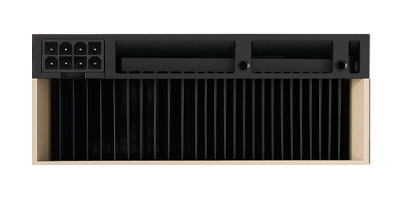NVIDIA A16 GPU - System Overview
Performance

Compared to its predecessor, the NVIDIA M10 GPU, the NVIDIA V16 supports 2x the VDI user density. Codecs like H.265 encode/decode, VP9, and AV1 decode, which offer next generation video compression are supported on the NVIDIA A16 GPU providing users with a high-quality video experience. It combines 4x graphics processors and is outfitted with 1280 shading units, 40 texture mapping units, and 32 ROPs, per GPU. With 4x separate graphics processors on a single board, each of the processors can support a pixel rate of 54 GPixels/s, a texture rate of 67.8 GTexel/s and a single-precision floating point calculation performance of 4.339 TFLOPS and double-precision floating point calculation performance of 135.6 GFLOPS. All of those values are multiplied by a factor of 4x given the unique quad-GPU board design, ideal for enabling and provisioning mixed user profile sizes and reducing latency. Featuring a large framebuffer per user and outfitted with NVIDIA’s RTX vWS software, this card is perfect for computer aided design (CAD) work and virtual desktop infrastructure for remote workers.
Of note, is Ampere based GPUs use a different method of communication called SR-IOV to communicate with the system. SR-IOV was developed after the Turing architecture GPUs of the previous generation and represents a dramatic improvement in capabilities. However, part of the certification of the A16 for use with manufacturer systems is support for this new method of communication by the hypervisors that support virtual GPUs.
Memory
Offering a unique architecture with a Quad-GPU design supported on a single board, the NVIDIA A16 GPU offers 4x separate instances of 16GB GDDR6 memory for a combined 48GB of memory. However, it is this board design paired with NVIDIA’s virtual PC Software (vPC) that enables this GPU to maximize productivity and performance for VDI deployments that are indistinguishable from a native PC. It also features error correcting code (ECC) for accurate and reliable processing of data, essential for CAD and CAM users.
Cooling & Power

With a passive cooling profile, servers and workstations certified for use with this GPU provide the thermal controls to ensure maximum performance and dispel thermal build-up.
Summary
NVIDIA’s A10 and A40 GPUs actually deliver more raw performance for certain applications because the NVIDIA A16 GPU is ideally suited for use in VDI. It is designed with attributes that enhance its use in a distributed environment for general usage. There are 4x separate GPUs on board, each of which is capable of supporting up to 64x VDI users with 1GB memory, 32 users with 2GB of memory or 16 users with up to 4GB of memory allocated. With separate GPU processors built-in, it can also be partitioned with variable memory allocations. It uses a Mellanox PCIe switch to connect the four separate GPUs on the board for fast inter-GPU communications. With 4x separate boards, it’s able to support much greater VDI density, with the ability to rout up to 4 separate ques on the card instead of just a single que. RT cores, shader units and encoding and decoding abilities, enable this card to support CAD applications as well as streaming video with ease for multiple instances.
Check Availability



